All Food Are Not Created Equal
Today's special guest on the Book-of-the-Day Show is my mentor Joel Salatin.
You can grab Joel's book "Holy Cows and Hog Heaven" by clicking here.
Listen to the interview on my podcast by clicking here.
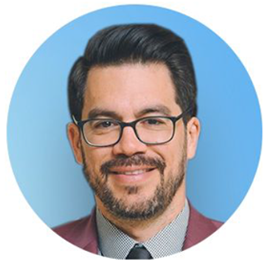
Tai Lopez
Sep 26, 2015
Transcription:
Tai: All right. Hello everybody. Welcome to today's Book Of The Day show. I'm here with a very special guest, Joel Salatin, and we're talking about a great book, "Holy Cows and Hog Heaven". So those of you who don't know, Joel is in large part responsible for a lot of the stuff that you see me doing when I was 18 or 19 years old out of high school. I went with Joel and did an apprenticeship, which is somewhat like a mentorship. It's like a mentorship with a lot of hard work on a farm. So how are you, Joel?
Joel: I'm doing great, Tai. Thanks for giving me the time.
Tai: No, thank you. Well let's jump into this book. It's called "A Food Buyer's Guide to Farm Friendly Food". I want to jump into this. I just got off the phone a couple hours ago with Richard Dawkins, who wrote the book "The Selfish Gene". You may have heard of him. He's an interesting...he was voted the top intellectual in the world in, I think, 2013. And I asked him what he thought of genetically modified food, because he's basically a biologist who studies genes and DNA. And he said, "I think it's dangerous, probably." Well, let me not put words in his mouth. He said, "It could be dangerous. We don't know much about it." Why don't we just jump in on that? One of the reasons people want to buy food from farmers is because they're worried about all the GMO and all this stuff. What are your thoughts?
Joel: Well, absolutely. In fact, every day we're seeing more and more failures, I should say, in the mechanically paradigmed food system as opposed to biologically paradigmed. And that mechanical idea is manifesting itself. We have a whole new lexicon today of words that anybody who's older than 40 doesn't ever remember hearing in grade school. We never heard the words campylobacter, listeria, e-coli, salmonella, let alone bovine spongiform encephalopathy. And gluten intolerance, food allergies, if you wanted to get together with friends, you just brought food. You didn't have all these other issues to deal with.
And so I think there's a deep down intuitive understanding that things are awry, things are not quite right, but many people really don't know where to go. They don't know where to go from that kind of gut feeling that maybe things...no pun intended, gut feeling. That there's something a little bit wrong, where do I go from here? And so I wrote this little book basically for seekers: seekers who are trying to figure out, "Okay, something's not quite right. What is it and where do I go from here?"
Tai: So you lay out in the book the difference between food that you would want to eat. Obviously, you have a farm, Polyface Farm, very famous farm. But if you were not a farmer, the things you would look for, you put in here, are things open. Is the farm hiding something? Can you just go drive on the farm? Or if you're at a farmers' market and you're talking to a farmer, will they just freely answer questions? As opposed to, a lot of people don't know, big factory farms, you almost have to have a hazmat suit to get in.
Joel: Yeah, in fact, the nicest sign I ever saw at a farm was in Australia. I drove up to this place. It looked like a no trespassing sign. I have one now here, and it says, "Trespassers will be impressed."
Tai: I love it. Why...?
Joel: I like that. So what you're looking for is a very transparent, open farm. We have a very open door policy. I've heard some people say that if you go to farmers' markets and you buy something from a farmer for three times, and by the end of the third time, if the farmer has not invited you out to the farm, that might be a red flag to you. You want that embrace, that open door, that hugs mentality.
Tai: Right. Interesting. Because a lot of times farmers' market, what's happening, I think, somewhat is it's not actually always the farmer. It's somebody buying the farmer and it's a little bit like the game telephone. The further away you get from the source, the more potential there is for being misled.
Joel: Sure. Sure, in the food system we call that the chain of custody. The longer that chain of custody, the more opportunities there are for a shyster or just a mistake to take hold.
Tai: How open, do you think, is the organic movement? Because you've talked a lot about going beyond organic. That just a label that says there's no pesticides may not be enough. So what's more open than just a label?
Joel: Well, the organic movement, as it's developed now, is actually not very open. It's largely been co-opted by the big corporate interests and it takes outfits suing the USDA a couple times a year to try to create a little bit of semblance of accountability there at the USDuh. I call it the USDuh. So I like to say we are customer certified. In other words, we are actually encouraging and incentivizing and making it easy for folks to come and visit the farm. And we find that that actually adds a lot more accountability, because if we're open 24/7/365 to scrutiny from anyone in the world, to see anything, anytime, unannounced, that keeps us on our toes as to how we're doing things. Because all of us need a little bit of accountability in our lives, and that's a good way to get it.
Tai: Dan Ariely, he wrote a book. He's a professor at Duke and he wrote a book about lying. He said, "Just a sign above a group of students taking an SAT test that says, 'Don't cheat. We're watching you,' lowers the incidents of cheating." So openness definitely works all the way around.
Joel: Yes, yes. That is for sure.
Tai: Now the next thing you talk about is food being treated biologically. Now, a lot of people go, "Isn't that a given? Isn't food always treated biologically?" What would you say to that?
Joel: I would say that most of the food in the developed countries, for sure, is not treated biologically. It's treated mechanically. And even animals are treated mechanically. Look, let's just take an example. For years, the USDuh took farmers like us to free steak dinners to teach us a new, scientific, progressive way of feeding cows, which was we'd take dead cows, we'd grind them up, and we'd feed them back to cows. And farmers like me who didn't embrace it were branded as Luddite and anti-progressive, anti-science, rebel, you name your...pick your adjective. And so I...here we are 30 or 40 years later and suddenly there was this big global recognition that, "Good grief, maybe we shouldn't oughta done that."
And the reason that we didn't do it was not because we hated the USDA or hated progress or were Luddites. It was because we looked around for an ecological pattern in which herbivores eat carrion. Guess what? It didn't exist. There is none. And so that's where, if you take that biology, that life, is not just mechanical, that there's actually something maybe even beyond what we understand. At the time, we didn't know. We didn't know the ramifications of feeding dead cows to cows. It had never been done before, and so we didn't know.
But a mechanical person said, "Well, feed is feed. And if we can do it cheaper and grow them faster, fatter, bigger, and cheaper, who cares?" Well, nature cares. And there's a lot about it that we don't understand and so when we take a biological view, we back up and say, "Wow, this isn't just inanimate piles of protoplasm to be manipulated, however cleverly humans can imagine to manipulate it." It's actually life. Life that responds and moves and acts. It's not just a bearing in a car. And that is a very fundamental worldview difference between the industrial food system and the more ecological food system.
Tai: Yeah, you can't just take Henry Ford's factory system that works great building cars and tractors, but not as good when it comes to figuring out how animals should be raised and the food we should eat. One question. I did a post on a book called "Eat The Yolks". It's a paleo book and it talks about fat and how we should eat the yolk of the egg, not just the egg whites. And I got a lot of response. One of them was from...some of the response, a lot of positives. Some were from people who talked about the China study, which says eating more vegetarian is healthy.
Others were from people saying, "No, fat is fat. Cholesterol is cholesterol. It's bad for you." And I was bringing up when I was there on the farm with you, how when we sent eggs...I wrote them back. I replied to their comment. I said, "How much...the eggs that you tested, how much alfalfa did they eat? How much clover did they eat? How many grasshoppers and insects did they eat versus the other eggs that you tested in a factory?" And people don't even understand what I'm talking about, but can you speak to this all eggs are not the same? So all these studies become very random because you never know what the control actually was.
Joel: Yes, well that is so well put. And we see it in everything. The China study to...well the China study's been largely debunked. It was...even the scientific community, it's an extremely unscientific thing, so it's been pretty much debunked. But if you go on to the Long Shadow Report that the U.N. did about how terrible cows are and, of course, the whole idea that animals take way too many resources, Jeremy Rifkin's stuff about it takes, whatever, 20,000 gallons of water to make a pound of beef. All these things, these are all...you're exactly right. They're all assuming a certain production model which is.
And the current production model, which prevails on the Earth, the current production model is one that is extremely anti-natural pattern. So the actual type...the data points that drive these studies and the statistics are coming from a certain orthodoxy. And that orthodoxy then drives all of the findings. And if you change the initial data points, then of course you have a whole different thing. I can just give you one example. We had our eggs checked for 12 nutrients through a Mother Earth News magazine study that used 12 pasture poultry farmers in the U.S.
And let's just take folic acid. The standard amount of folic acid, which is very important for pregnant women, it's an essential fatty acid, folic acid, the average egg in America, the regular factory egg, has about 48 micrograms per egg. And our eggs tested out 1,000 per the egg, micrograms per egg. The same thing is true with Vitamin A, riboflavin. You can go down the line, and the nutrient quality, the nutrient ratios, and volumes, and qualities are completely different. You don't even think...it's like the difference between Mercury and Pluto.
This is not...these are not little 5% deviations. Grass-finished beef, 300% more riboflavin. Well what's important about riboflavin? Well it's the one that makes your nerves function real well and calms you down. Why is everybody going bonkers? Well we're not getting any riboflavin because we're treating our beef animals like they're some sort of machine. Just fuel them up with whatever you can find and make them pump up and grow fast, and we're good.
And so Sir Albert Howard said, he's the father of modern aerobic composting, he said, in 1943 in an agricultural test, he said, "When you begin feeding your soils with artificial manures," that's what he called chemical fertilizers, "they grow artificial plants, which grow artificial animals, which feed artificial people who are then only able to stay alive by the use of artificials." Which of course, in 1943, he couldn't have foreseen the growth of the pharmaceutical industry, but if that isn't an artificial...propped up with artificials, I don't know what is. It was a very prescient look into the future.
Tai: Yeah. And I think that when you look at trends...I read a trend that in the next, I think, 20 years we'll reach a point in the U.S. where 50% of kids will either be diabetic or pre-diabetic. And already, between the age of two and five, not even five-year old kids, about 8% of American children that age are either fat or obese.
Joel: Yes. Yeah, well the U.S. loves to lead the world in certain things, but there's some things we lead the world in that aren't very good. One of them is we now lead the world in chronic non-infectious morbidity diseases. That's not a good place to be number one in the world. And so, yeah, and these are the kinds...the trend lines that we're seeing...for the first time we're hearing that the next generation won't live as long as the previous one. There are numerous trend lines that are quite unsettling to anybody who's watching these trend lines.
Morbidity trend line, pathogen, toxicity, childhood diseases from leukemia to obesity to diabetes, all of these trend lines are just...they're hockey stick trend lines. And anyone who studies statistics know that hockey stick trend lines are the ones you've got to be...they don't go on forever. Things implode. Things fall apart when you have a hockey stick trend line.
Tai: So if you...let's say you were in an alternate environment. You didn't live on a farm. For whatever reason you lived in a city, a small city or a large city, and you had a family, what are three things you would do right away based on the things you're talking about in this book, "Holy Cows and Hog Heaven", Joel, that you think would bring...if you had been living a conventional life, eating conventional food. Three changes...
Joel: What are three changes?
Tai: Yeah, that you would do immediately, knowing what you know as a leader in food thought movement, maybe we call it.
Joel: Sure, sure. Well the first thing I would do is probably put my foot through the television. Just give myself some time. But in reality, the first thing would be to look down and take a recreational entertainment budget for the year and say, "Okay, whatever time and money we were budgeting for just fluffy entertainment, we're going to take that amount of time and money and we're going to devote it going on a treasure hunt of integrity food in our community."
Fortunately now...now that may mean a trip to farmers' market. It may mean join a CFA. It may mean taking the family out to some local farms. It may mean joining the California Ecological Food and Farming Association, whatever. But the point is there is a tribe. There is a complete, comprehensive tribe that's out here. It doesn't make the front page of the New York Times every day, but it is a growing, credible tribe that is producing integrity food. And it's much, much larger now than it was when we started a few decades ago.
So just put some attention on finding it. You cannot make a change in your life without changing something you do. I wish I could snap my fingers and everybody could suddenly eat great stuff and be healthy and not have to make any changes. But the fact is that if you're going to change your life's trajectory, you have to change your life's routine. That's the way it works. And so I like to think about taking the entertainment budget, recreational budget, time, and money. And just take one year, I've seen people do this all over in condominiums, high rise apartments, big cities.
And in one year they find all these wonderful treasures in their community and completely change their habits, they dining habits. Number two, I would say get in your kitchen. You need to have an idea in your head. You need to realize that becoming a visceral participant, a knowledgeable, visceral participant in the game of food acquisition and development has got to be as interesting, exciting, and sexy to you as being passionately informed about the latest dysfunction in the Kardashian household.
At some point, you have to actually cultivate an interest in a visceral relationship with this ecological umbilical. We're not going to levitate into some Star Trek nirvana and disembed ourselves from this ecological womb we find ourselves in. And then the third thing, I think it's exciting to do something for yourself. Maybe you just have a patio. Maybe all you have is a rooftop. You can put a pot up there, a pot garden. Yeah, pot, yeah. But anyway, a container garden, a beehive, goodness, a vermicomposting kit.
You can get them for less than $50. Put a vermicomposting pit under your kitchen sink. Instead of running everything down through the garbage disposal, feed the worms, and get earthworm castings. You can put those in your flower pots. Or better yet, dump out the flower pots and put in tomato plants. Grow your own tomatoes. Get rid of the parakeet and the boa constrictor and the gerbil, and get two chickens in your house. They're a lot more...they're great teenage mentors.
If you're having trouble with your teenagers in your house, there's nothing like a chicken as a role model. She gets up first thing in the morning, she never complains, she works all day eating garbage and laying you egg treasures. And then as soon as the sun starts to go down, she's heading for bedtime. She's not gallivanting around. She's not getting drunk, driving your car into poles or anything, requires no insurance whatsoever. This is the ideal teenage role model.
Tai: I like that. I could...
Joel: Yeah, just understanding the awe, the mystery, the specialness of life, of growing something. It has spiritual, emotional, therapeutic effects and it actually can give your internal community of bacterial beings something that's very special.
Tai: Well this was awesome. This is the book, I'm holding it up on video here, "Holy Cows and Hog Heaven". I have it listed in my top recommended books. Joel, if people want to know...and you're writing...you got a new book coming out? You always have a new book, I'm sure.
Joel: Always, always, Tai. I'm always either working on one or finalizing one. Yeah, I do. There's a new one coming out next spring. It'll be book number 10. And it'll be, hopefully, around in February. And the title is "Pigness of Pigs: Does God Care". I call this my coming out book. I'm calling myself the Christian libertarian environmentalist capitalist lunatic. And I think that the conservative Christian right has really done itself a great disservice for many decades by poo-pooing and...well just making fun of creation care of the environmentalists.
And yeah, there's plenty to make fun on some of those radical environmental fringes, absolutely. But to just paint with a broad brush that if you hug a tree you're some kind of a pagan, anti-God barbarian is not only foolish, it is...it does a lot of injustice to the kind of creation stewardship that the conservative religious right ought to be embracing and evangelizing for. And so this book, I'm hoping, will speak to that creation care in a very visceral, very practical way. The question is, what does a farm that...a farm and a food system that exhibits, for example, forgiveness, look like?
Does it look like a Tyson farm or does it look like a pasture livestock farm? These great, big spiritual principles, what do they actually look like on the land? And Tai, I know that your time among the Amish, this is one of the things that the Amish make a big point of, is that it's not just...spiritual thoughts are not just academic focus group stuff. They actually are supposed to manifest themselves in the way you actually live your life and the decisions that you make. And so this is a wake-up call, an encouragement challenge, if you will.
And it's funny, the people that seem more excited about it than the conservative religious right are the environmentalist radical liberals who are saying, "Man, I'm going to get that for my Christian friends."
Tai: There's going to be a lot of handing out this book from group to group. Well, awesome. Well, people can check out...what's the website? Is it Polyface Farms?
Joel: Yes, Polyface Farms.
Tai: They can...
Joel: Polyfacefarms.com. We have a good website and you can get things there or see more information. Of course, you can always get books through Amazon or your local bookstore or whatever.
Tai: Awesome. Well, Joel, thanks so much for being on the show. "Holy Cows and Hog Heaven" with Joel Salatin. Talk to you guys soon.
COMMENTS
Best of Tailopez
-
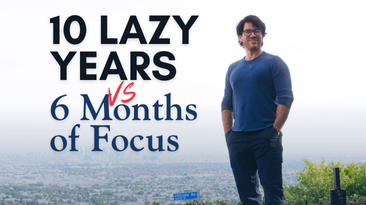 Ten Lazy Years Can Be Erased With Six Focused Months
Ten Lazy Years Can Be Erased With Six Focused Months -
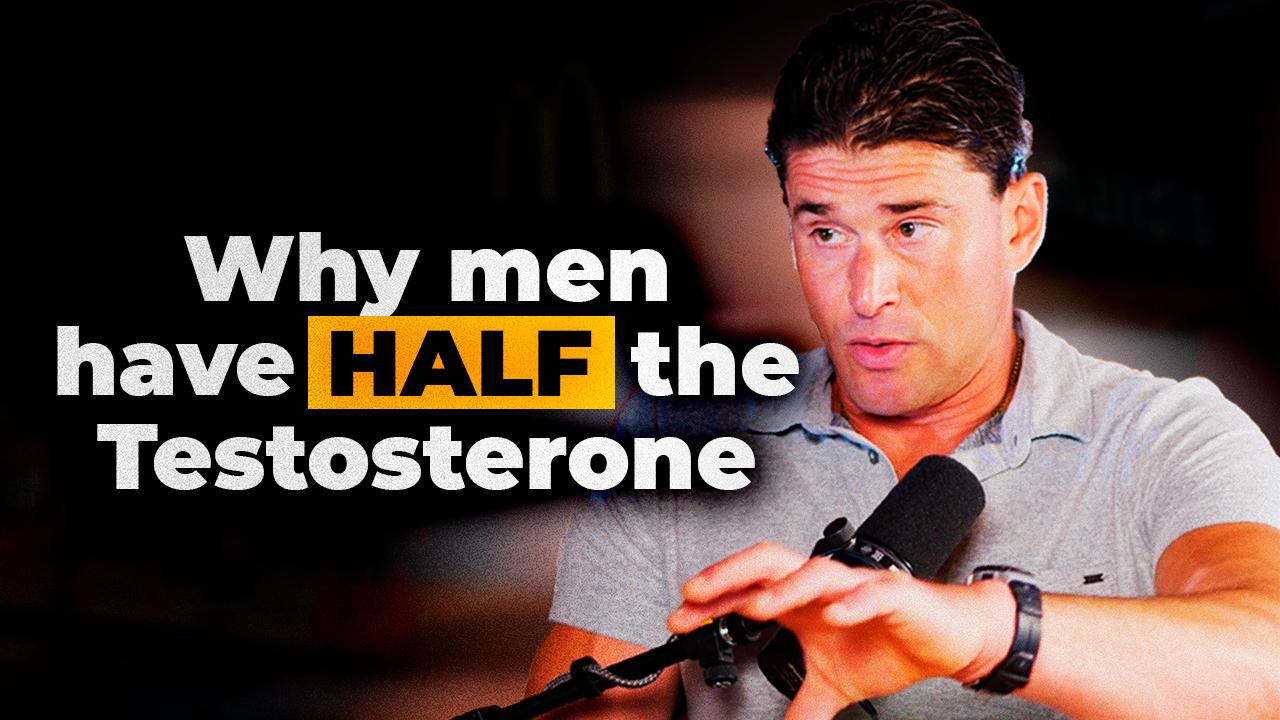 Why Men's Testosterone Is Half Their Grandfather's with Ben Greenfield
Why Men's Testosterone Is Half Their Grandfather's with Ben Greenfield -
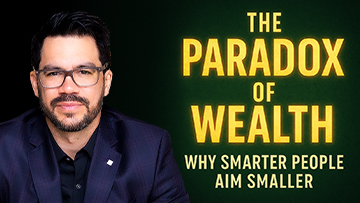 The Paradox of Wealth: Why Smarter People Aim Smaller
The Paradox of Wealth: Why Smarter People Aim Smaller -
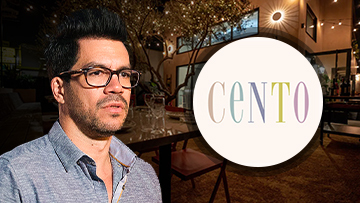 Mamma Mia in West Adams: Tai Lopez Finds LA's Pasta Holy Grail at Cento Pasta Bar
Mamma Mia in West Adams: Tai Lopez Finds LA's Pasta Holy Grail at Cento Pasta Bar -
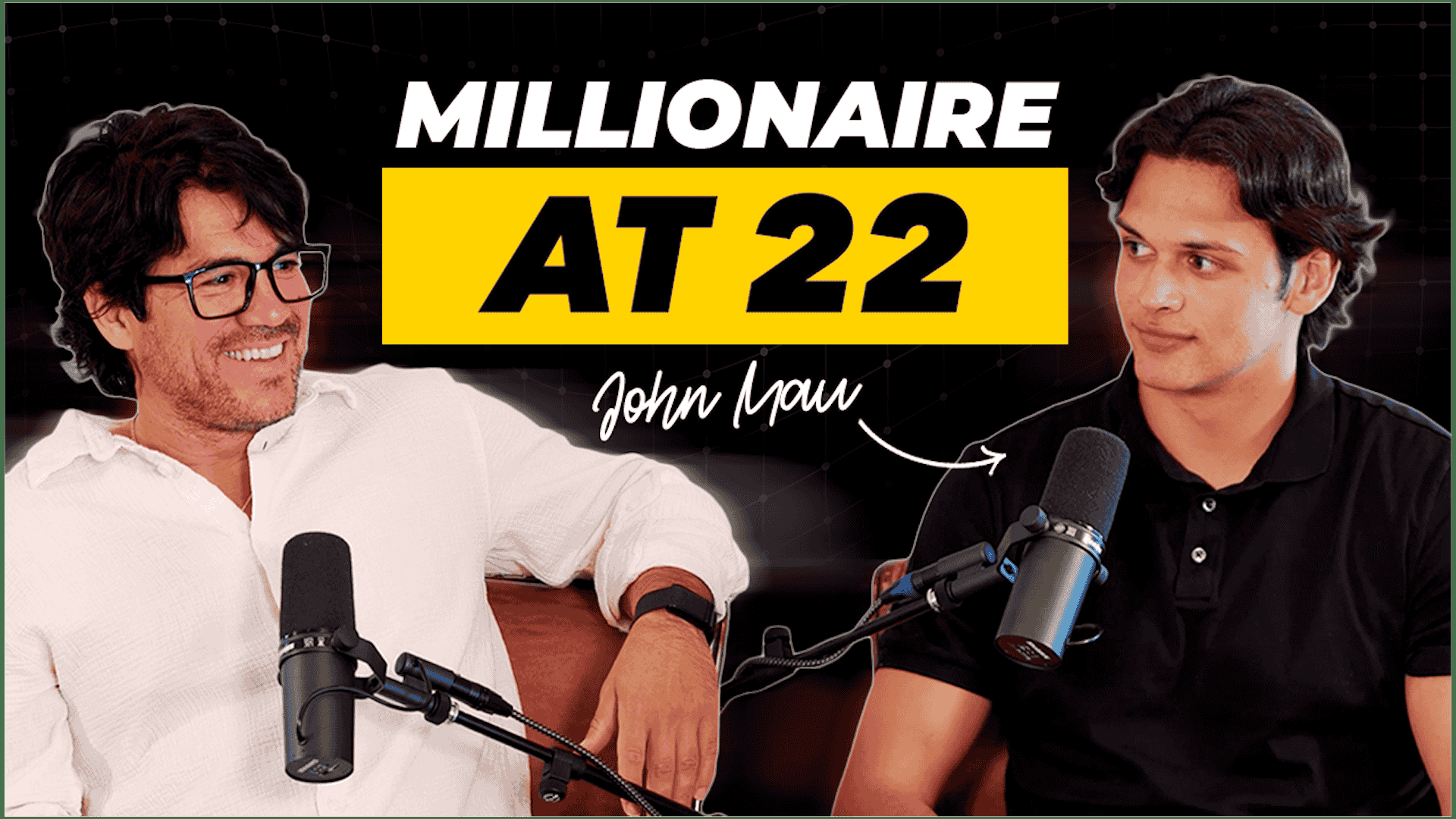 Sales Training, Scaling, and Breaking Objections: Tai Lopez with Johnny Mau
Sales Training, Scaling, and Breaking Objections: Tai Lopez with Johnny Mau

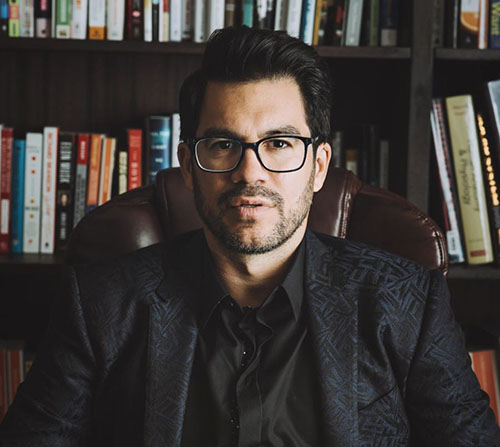
0 Comments